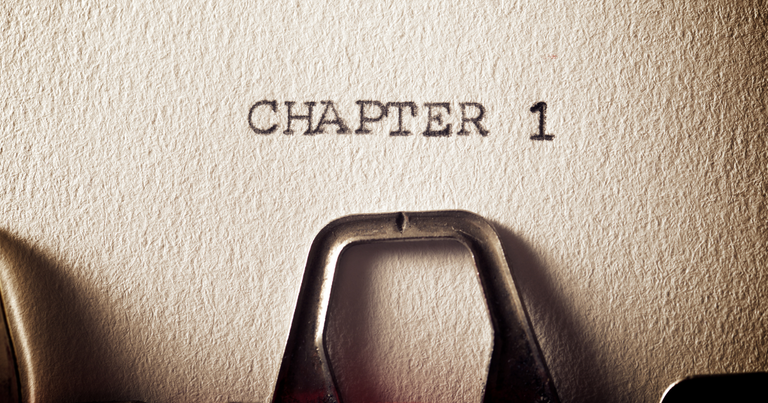
You're sitting at your keyboard - eyes darting up and down your screen.
You sip your coffee (or perform whatever your writing ritual is) as you tap away at the keys thinking:
"I hope people actually want to read this..."
Your eyes mill further up as you reread the opening paragraphs. Your brow furls as you silently wonder if you'll pull your readers deep into the masterpiece you've composed.
"Is the opening too long? Is it too short? Did I say enough, too little, or too much? Am I going to lose them here... or there...?" Your head is filled with questions...
And you're not alone.
I can't count how many times the same thoughts have ricocheted back and forth off the interiors of my skull. Because... if you're anything like me...
You actually care about writing things people will want to read.
The Technique Of The Greats

James Patterson, J.K. Rolling, Robert Ludlum, and Tom Clancy all have something in common:
The books they've written have been transformed into Blockbuster movies and world-class Video Games.
But what makes them so good? How do they drag the reader along, line after line, through 400+ pages?
How do they captivate the best in Hollywood to such a degree that they scramble to fork out multi-million dollar budgets for films?
And can you do it too?
Maybe. Maybe not. A lot of where you take things really depends on your writing talent, your drive, and your ability to market yourself...
But you can at least use some of the same writing techniques they did to get them there. And the one you're reading about right now can improve EVERY kind of writing you will EVER do.
In fact, you can use it to write better:
- Hive posts...
- Novels
- Web pages / web copy...
- Emails...
- Anniversary love letters...
...better anything and everything you write...
And it's all about action. It's about movement. It's about conflict. It's about story.
Mr. Patterson's Chapter 1

Have you ever read a James Patterson book?
Because if you have, you'll notice something very specific about Chapter 1 in virtually every book he writes.
In fact, you'll notice this thing in most of the best-selling books you'll ever read. You see, Patterson doesn't waste a second explaining how we got to where we're at.
Instead, he drops us (sometimes flat on our face) into the middle of the conflict - smack dab in the "midst of things" - and that's what I want to talk to you about today.
Because this practice in writing is called:
"In Media Res" - The Eye Of The Storm

In Media Res is Latin for "In the midst of things." So, what does it mean in writing?
Essentially, it means you cut out all the "filler" and remove all the stuff that lacks direct and actionable meaning (especially, for correspondence), or real action, movement, or conflict (for storytelling formats).
You also cut all the "set up" that leads into whatever you're planning to write.
For example...
You'll notice at the beginning of this article I started with a single line:
"You're sitting at your keyboard - eyes darting up and down your screen."
But my non-writerly brain wanted me to say:
"I'm going to give you a hack that can improve your writing. But first, I want to tell you a story, because I think it will help illustrate the thing that I'm trying to say. And then later, I'll show you why I did that. The story is about you. Are you ready? You're sitting at your keyboard - eyes darting up and down your screen."
But what do you notice about that entire, painful, drawn-out paragraph?
I notice two things:
#1 Nothing is actually happening...

Our brains are wired to pay attention to conflict and action.
In fact, according to scientific studies, we actually experience stories physiologically in our body as if we're actually present in the story itself!
When you write - you can exploit that fact to create emotions within your readers. And surprise them with twists and turns to keep them going.
#2 You don't really need to know any of that...

Everything in that second (non-writerly) paragraph is non-actionable, unnecessary, unhelpful garbage you don't need to read. It's the rough thought-work I was going through before actually writing the story.
And here's the secret:
Your reader doesn't need any of that
It's a total waste of their time. And you'll lose them.
Instead...
Drop your reader in the "midst of things"...

And do it over and over again.
When I open with the line:
"You're sitting at your keyboard - eyes darting up and down your screen"
My intention is to drop you into a setting where you can immediately paint a visual picture. I didn't think it required much description - because if you're reading this on Hive - you're probably familiar on a personal level with the scene.
And that's another area where we can sometimes veer away from "In Media Res":
OVER-describing...
AVOID THE OVER-DESCRIPTION TRAP

When you were in school, you may have heard the classic advice:
"Describe EVERYTHING in detail. How does it feel, smell, taste, look? Now... paint that picture for your audience!"
But sometimes, what they're really saying is this:
"How does it feel, smell, taste, look? Now... drown your audience in a bunch of arbitrary description that isn't useful to them or the story that's being told. Really! Just waterboard them in the stuff!"

If you've ever tried reading a book that does this (and found yourself daydreaming past 5–10 page clumps, successively) you know exactly what I'm talking about.
"The park had lush green grass with tiny brown spots and little yellow chutes. There was a pile of what looked like light brown, rust-colored maple leaves with yellow-green spots. And there was a little purple leaf angled awkwardly on the top of the pile. And then... my dog barked..."
If it doesn't pertain to what you're writing... who cares?
To avoid that trap and stay "In Media Res" - cut anything from your writing that isn't valuable to your reader. If the words on the page don't:
- help to move your reader through the story
- pertain to something they later need to know
- illustrate a point they need delivered
- help the reader understand what's happening
- introduce new character elements
...then burn them... burn them all!
What if you're not writing a story? What if... you're writing an email???

Obviously, not all the emails you send will be written in story format. But that doesn't mean you can't drop people "In Media Res"... into the midst of what matters...
For instance, instead of saying:
"Hey Joe,
I wanted to contact you and let you know that I have a new course coming out on prospecting for leads on Linkedin. I thought you might be interested in joining because you run a freelancing business."
I don't know about you... but when I read that 👆 my eyes gloss over.
You could just say 👇:
"Hey Joe,"
Can I give you 13 new clients for your freelancing business this month? Because that's what my students get on average after going through my newest course."
The first version mills around, explaining and not getting to the value that's being offered. With people receiving hundreds of emails per day on average - no one has time to fiddle around with arbitrary language.
But the second version delivers the value in just a couple of lines with clarity. It helps the recipient to qualify themselves as "interested" or "not interested" within a couple short seconds and helps them answer the question they're asking:
"...is this worth my time...?"
What If You're Writing Your Anniversary Card?

Here's a random example of using this to ignite your love letter:
"...I wish he'd kidnap me."
I never told you... but those are the exact words I was thinking that night I met you on the boardwalk. You were so sexy. I couldn't even speak. And it's a good thing I didn't tell you what was on my mind. You might have run away.
But you were so irresistible...
...just like you still are.
Forever taken by you,
[Signature].
P.S. Looking forward to later... 💝
How Can You Build This Into Your Writing?

"Okay, so all this sounds fine and good... but how do I actually do it?"
Alright... so it may not come 100% naturally to write this way at first. But don't worry. Here are some things to keep in mind:
1. Start practicing during the editing process.
If you're not used to jumping into the middle of your writing pieces and are, instead, accustomed to warming up your writing first - then, start editing for "In Media Res" after you've already completed your first draft.
Many of us may need to warm up our writing chops before we even realize where the true value of what we're writing is at.
And that's okay.
Just go back and edit out the stuff you don't need later. Look for what is meaningful to your reader, what is actionable, and what is action-packed.
Then, edit out the rest.
2. Practice with everything you write.
As you practice this more and more - it will eventually become second nature. You'll begin to look at what you're writing from the "inside out" instead of walking yourself from the "outside" into your piece.
And as a result, you'll start planting your reader more accurately into the center of the action. Right smack dab "in the midst of things."
You'll become a better writer every time you do it. With every new opportunity you identify to move your reader down an emotion-evoking journey that puts them at the center - your eyes will be sharpened...
...and your ears will be keen, easily hearing their cries for better entertainment. 😉
Wrapping Up

As you can hopefully see at this point, you can use "In Media Res" to spice up any kind of writing you do.
Use it to drop your readers into "the midst of things," and get more delighted reactions from those who read what you write.
- Take it to work.
- Use it for romance.
- Use it for storytelling.
- Become the next Best-Selling Author.
It's up to you!
Note from me:
Hey!
I hope I was able to deliver some value to you today! If you enjoyed this - please give me a follow and a vote!
Thanks!
@badseedalchemist
P.S. How can you imagine using this to improve your writing? Leave a comment!
Very good, so many writings get bogged down in describing everything. People are drawn to the snappy in the thick of it stuff
Thanks @meesterboom! Means a lot coming from you!
👆...this is something you are a master of, good sir.
Aw shucks, ta! I hope someone can take something from your post above, it's awesome!
That's super nice of you. :) Really appreciate it and glad you liked it. I'm finally getting to a stage in my life where I can put out more valuable content and messages.
Note: I was a real mess for a while and spent the last couple years doing lots of clean up - which is part of the reason I stopped posting on Hive for a time.
After beginning my quest to emerge from the drug-induced haze I was in over 2 years ago, I dove into an exploration and deep learning phase as I aimed to dig myself out of the rather formidable hole. And at that juncture, I didn't have the mental capacity to write here along with everything else.
Looking forward to posting and engaging here and there from now on. It may not be all the time... but I hope to see you about!
Thanks for your comments!
I am sorry to hear you had to go through that to come out to the other side but glad you made it.
You shall see me I am sure! I shall look out for ya :OD